Analysis of HRM's Role in Employee Recruitment and Retention
VerifiedAdded on 2022/08/21
|10
|2095
|10
Report
AI Summary
This report delves into the crucial role of Human Resource Management (HRM) in both recruiting and retaining employees within an organization. It highlights the strategic importance of HRM in attracting suitable candidates, emphasizing key steps such as job postings, resume analysis, interviews, and assessments. The report also explores the significance of employee retention, focusing on the impact of training and development, positive workplace policies, and rewards and recognition programs. The discussion underscores how HRM practices directly influence employee motivation, job satisfaction, and ultimately, the overall success and profitability of the organization. The report concludes by emphasizing the vital role of HRM in ensuring a productive and engaged workforce that contributes to the long-term goals of the company. Reference to the key steps in recruitment and retention are made, along with the impact of the HRM on the overall success of an organization.
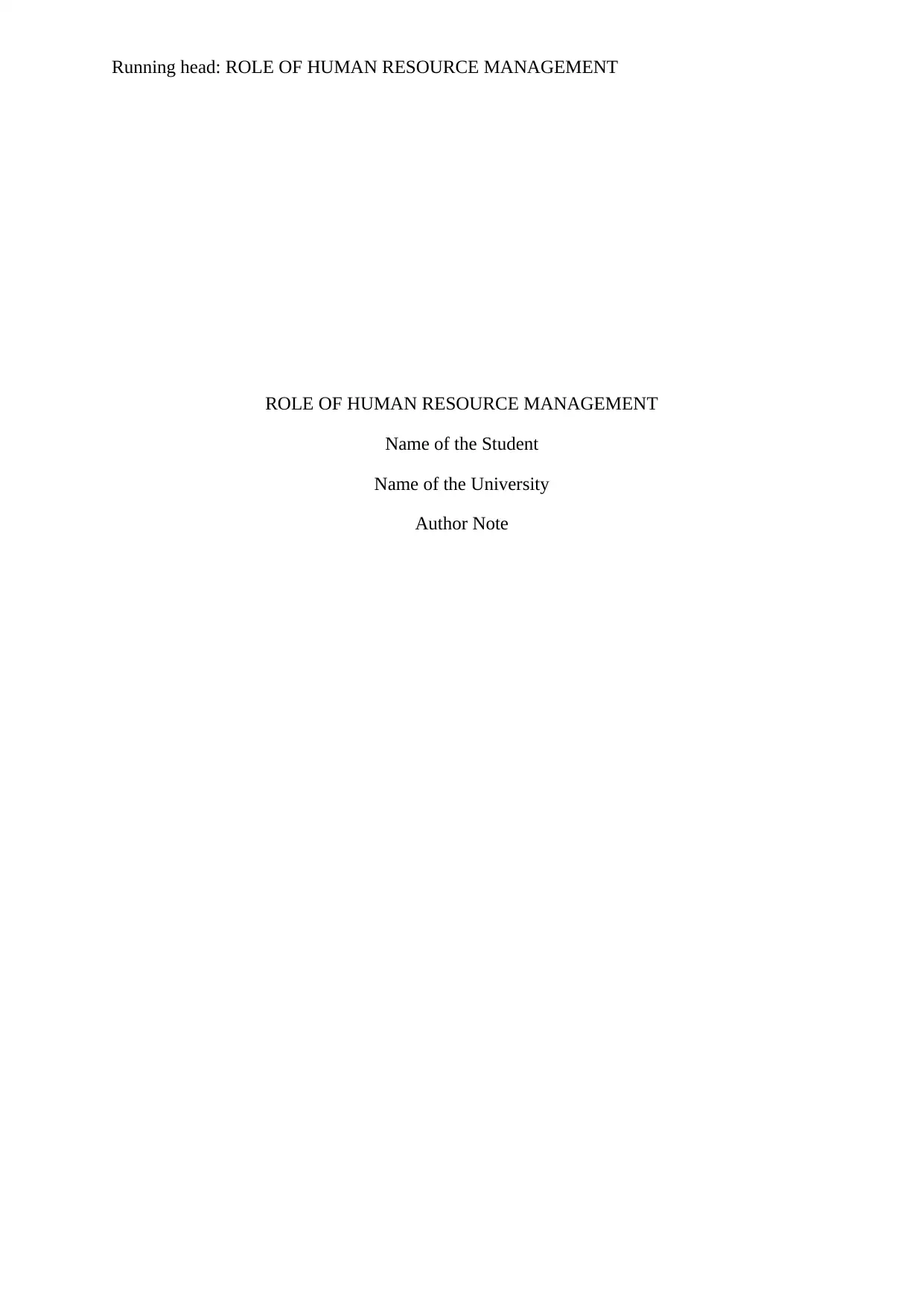
Running head: ROLE OF HUMAN RESOURCE MANAGEMENT
ROLE OF HUMAN RESOURCE MANAGEMENT
Name of the Student
Name of the University
Author Note
ROLE OF HUMAN RESOURCE MANAGEMENT
Name of the Student
Name of the University
Author Note
Paraphrase This Document
Need a fresh take? Get an instant paraphrase of this document with our AI Paraphraser
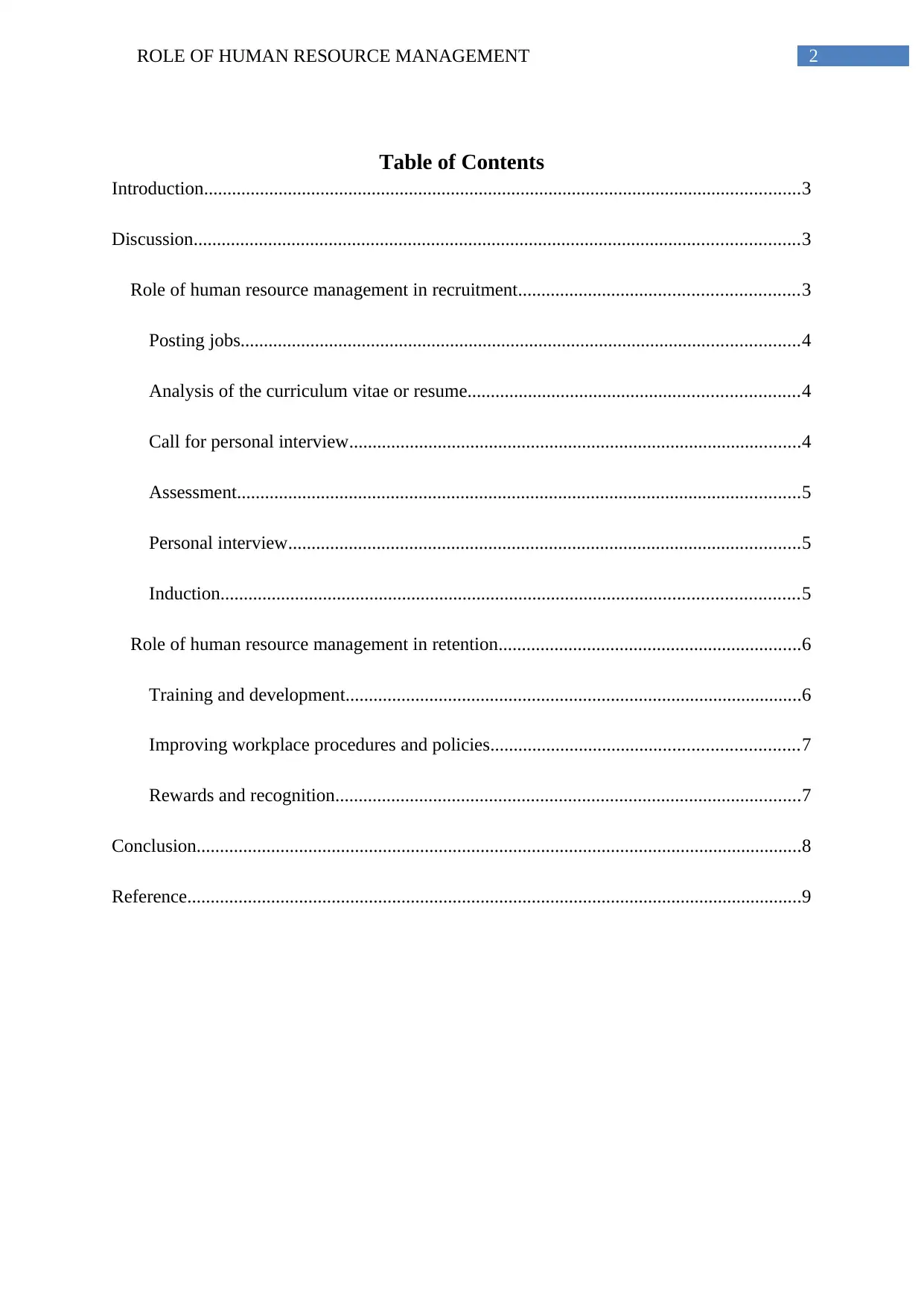
2ROLE OF HUMAN RESOURCE MANAGEMENT
Table of Contents
Introduction................................................................................................................................3
Discussion..................................................................................................................................3
Role of human resource management in recruitment............................................................3
Posting jobs........................................................................................................................4
Analysis of the curriculum vitae or resume.......................................................................4
Call for personal interview.................................................................................................4
Assessment.........................................................................................................................5
Personal interview..............................................................................................................5
Induction............................................................................................................................5
Role of human resource management in retention.................................................................6
Training and development..................................................................................................6
Improving workplace procedures and policies..................................................................7
Rewards and recognition....................................................................................................7
Conclusion..................................................................................................................................8
Reference....................................................................................................................................9
Table of Contents
Introduction................................................................................................................................3
Discussion..................................................................................................................................3
Role of human resource management in recruitment............................................................3
Posting jobs........................................................................................................................4
Analysis of the curriculum vitae or resume.......................................................................4
Call for personal interview.................................................................................................4
Assessment.........................................................................................................................5
Personal interview..............................................................................................................5
Induction............................................................................................................................5
Role of human resource management in retention.................................................................6
Training and development..................................................................................................6
Improving workplace procedures and policies..................................................................7
Rewards and recognition....................................................................................................7
Conclusion..................................................................................................................................8
Reference....................................................................................................................................9
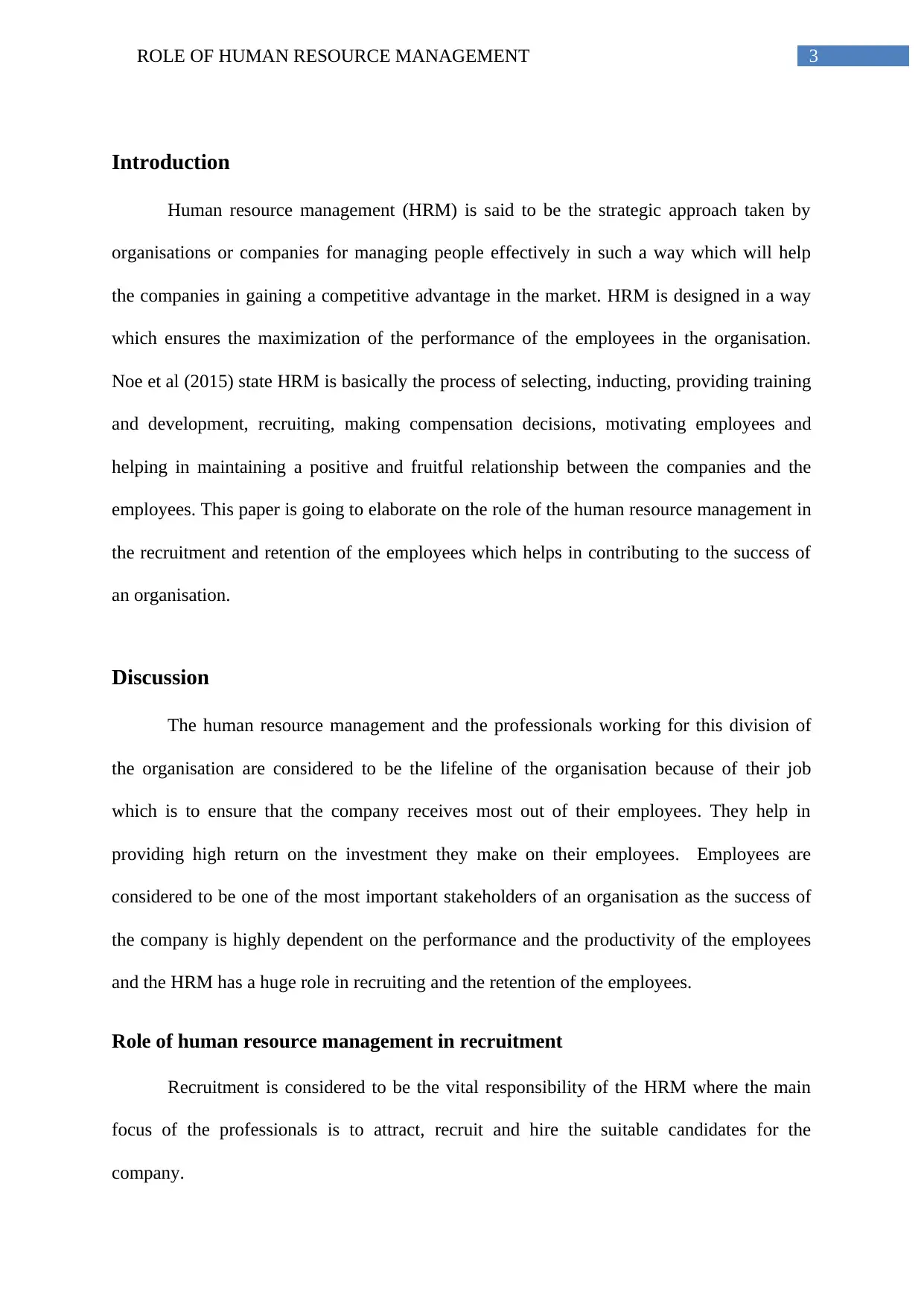
3ROLE OF HUMAN RESOURCE MANAGEMENT
Introduction
Human resource management (HRM) is said to be the strategic approach taken by
organisations or companies for managing people effectively in such a way which will help
the companies in gaining a competitive advantage in the market. HRM is designed in a way
which ensures the maximization of the performance of the employees in the organisation.
Noe et al (2015) state HRM is basically the process of selecting, inducting, providing training
and development, recruiting, making compensation decisions, motivating employees and
helping in maintaining a positive and fruitful relationship between the companies and the
employees. This paper is going to elaborate on the role of the human resource management in
the recruitment and retention of the employees which helps in contributing to the success of
an organisation.
Discussion
The human resource management and the professionals working for this division of
the organisation are considered to be the lifeline of the organisation because of their job
which is to ensure that the company receives most out of their employees. They help in
providing high return on the investment they make on their employees. Employees are
considered to be one of the most important stakeholders of an organisation as the success of
the company is highly dependent on the performance and the productivity of the employees
and the HRM has a huge role in recruiting and the retention of the employees.
Role of human resource management in recruitment
Recruitment is considered to be the vital responsibility of the HRM where the main
focus of the professionals is to attract, recruit and hire the suitable candidates for the
company.
Introduction
Human resource management (HRM) is said to be the strategic approach taken by
organisations or companies for managing people effectively in such a way which will help
the companies in gaining a competitive advantage in the market. HRM is designed in a way
which ensures the maximization of the performance of the employees in the organisation.
Noe et al (2015) state HRM is basically the process of selecting, inducting, providing training
and development, recruiting, making compensation decisions, motivating employees and
helping in maintaining a positive and fruitful relationship between the companies and the
employees. This paper is going to elaborate on the role of the human resource management in
the recruitment and retention of the employees which helps in contributing to the success of
an organisation.
Discussion
The human resource management and the professionals working for this division of
the organisation are considered to be the lifeline of the organisation because of their job
which is to ensure that the company receives most out of their employees. They help in
providing high return on the investment they make on their employees. Employees are
considered to be one of the most important stakeholders of an organisation as the success of
the company is highly dependent on the performance and the productivity of the employees
and the HRM has a huge role in recruiting and the retention of the employees.
Role of human resource management in recruitment
Recruitment is considered to be the vital responsibility of the HRM where the main
focus of the professionals is to attract, recruit and hire the suitable candidates for the
company.
⊘ This is a preview!⊘
Do you want full access?
Subscribe today to unlock all pages.

Trusted by 1+ million students worldwide
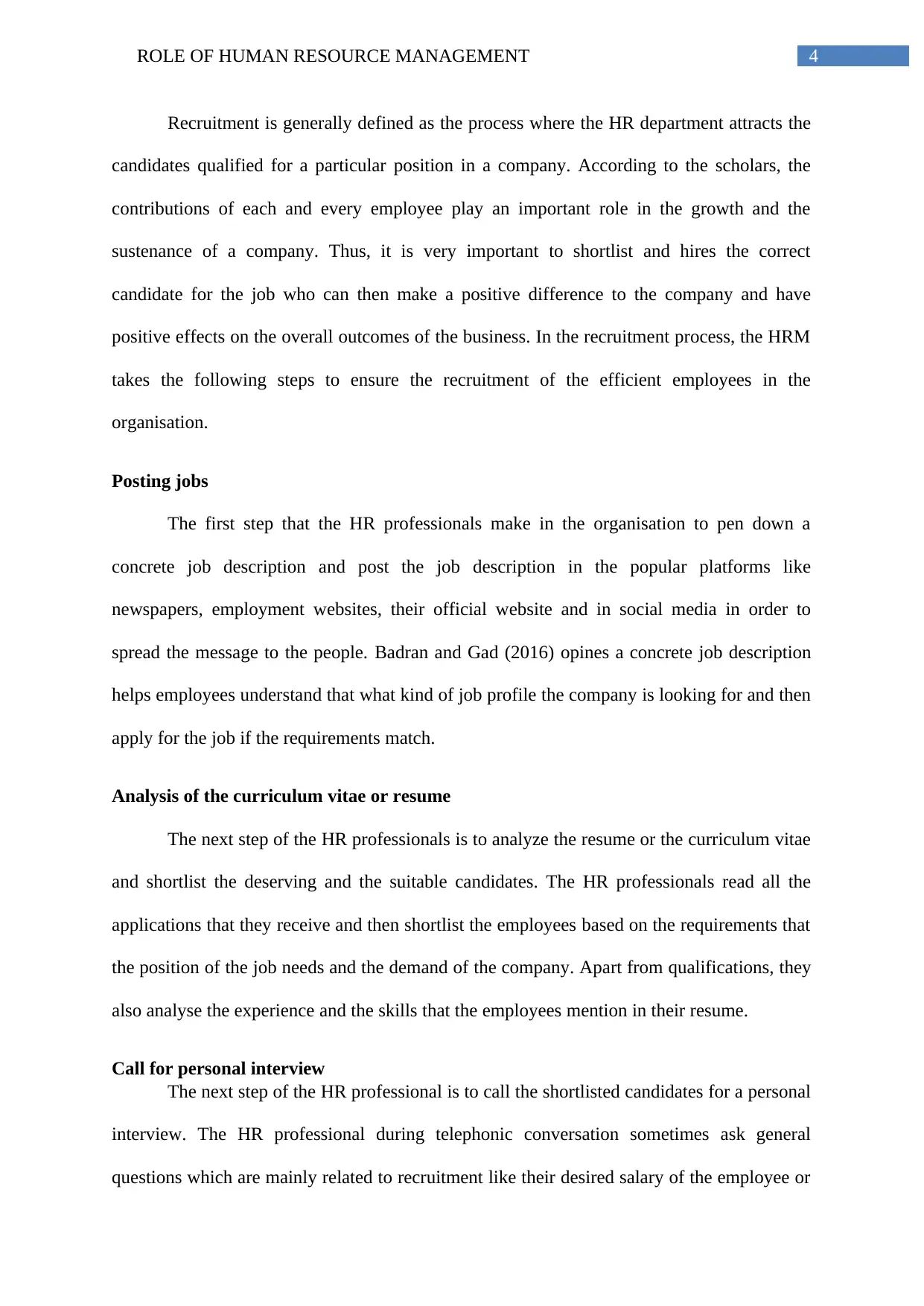
4ROLE OF HUMAN RESOURCE MANAGEMENT
Recruitment is generally defined as the process where the HR department attracts the
candidates qualified for a particular position in a company. According to the scholars, the
contributions of each and every employee play an important role in the growth and the
sustenance of a company. Thus, it is very important to shortlist and hires the correct
candidate for the job who can then make a positive difference to the company and have
positive effects on the overall outcomes of the business. In the recruitment process, the HRM
takes the following steps to ensure the recruitment of the efficient employees in the
organisation.
Posting jobs
The first step that the HR professionals make in the organisation to pen down a
concrete job description and post the job description in the popular platforms like
newspapers, employment websites, their official website and in social media in order to
spread the message to the people. Badran and Gad (2016) opines a concrete job description
helps employees understand that what kind of job profile the company is looking for and then
apply for the job if the requirements match.
Analysis of the curriculum vitae or resume
The next step of the HR professionals is to analyze the resume or the curriculum vitae
and shortlist the deserving and the suitable candidates. The HR professionals read all the
applications that they receive and then shortlist the employees based on the requirements that
the position of the job needs and the demand of the company. Apart from qualifications, they
also analyse the experience and the skills that the employees mention in their resume.
Call for personal interview
The next step of the HR professional is to call the shortlisted candidates for a personal
interview. The HR professional during telephonic conversation sometimes ask general
questions which are mainly related to recruitment like their desired salary of the employee or
Recruitment is generally defined as the process where the HR department attracts the
candidates qualified for a particular position in a company. According to the scholars, the
contributions of each and every employee play an important role in the growth and the
sustenance of a company. Thus, it is very important to shortlist and hires the correct
candidate for the job who can then make a positive difference to the company and have
positive effects on the overall outcomes of the business. In the recruitment process, the HRM
takes the following steps to ensure the recruitment of the efficient employees in the
organisation.
Posting jobs
The first step that the HR professionals make in the organisation to pen down a
concrete job description and post the job description in the popular platforms like
newspapers, employment websites, their official website and in social media in order to
spread the message to the people. Badran and Gad (2016) opines a concrete job description
helps employees understand that what kind of job profile the company is looking for and then
apply for the job if the requirements match.
Analysis of the curriculum vitae or resume
The next step of the HR professionals is to analyze the resume or the curriculum vitae
and shortlist the deserving and the suitable candidates. The HR professionals read all the
applications that they receive and then shortlist the employees based on the requirements that
the position of the job needs and the demand of the company. Apart from qualifications, they
also analyse the experience and the skills that the employees mention in their resume.
Call for personal interview
The next step of the HR professional is to call the shortlisted candidates for a personal
interview. The HR professional during telephonic conversation sometimes ask general
questions which are mainly related to recruitment like their desired salary of the employee or
Paraphrase This Document
Need a fresh take? Get an instant paraphrase of this document with our AI Paraphraser
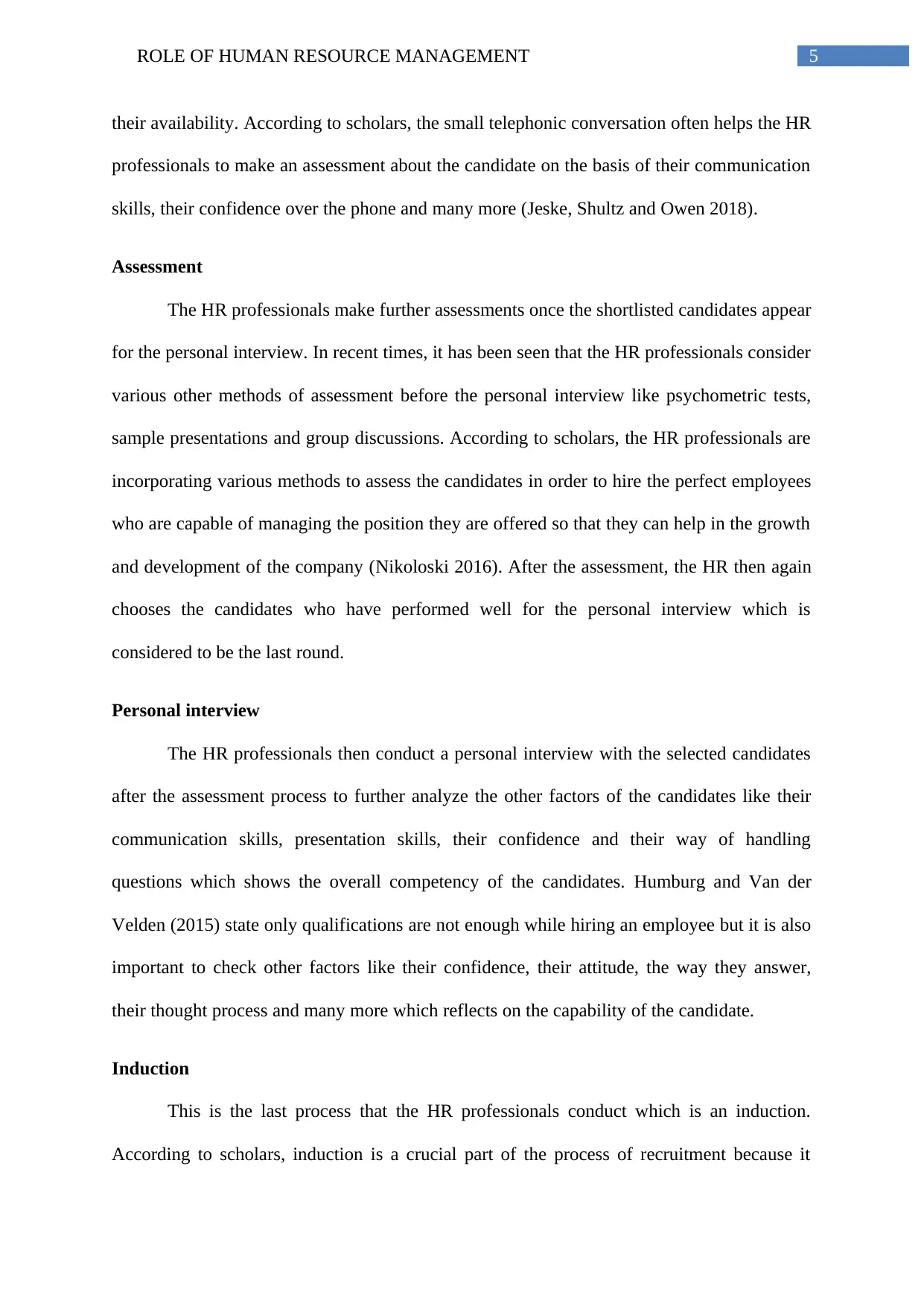
5ROLE OF HUMAN RESOURCE MANAGEMENT
their availability. According to scholars, the small telephonic conversation often helps the HR
professionals to make an assessment about the candidate on the basis of their communication
skills, their confidence over the phone and many more (Jeske, Shultz and Owen 2018).
Assessment
The HR professionals make further assessments once the shortlisted candidates appear
for the personal interview. In recent times, it has been seen that the HR professionals consider
various other methods of assessment before the personal interview like psychometric tests,
sample presentations and group discussions. According to scholars, the HR professionals are
incorporating various methods to assess the candidates in order to hire the perfect employees
who are capable of managing the position they are offered so that they can help in the growth
and development of the company (Nikoloski 2016). After the assessment, the HR then again
chooses the candidates who have performed well for the personal interview which is
considered to be the last round.
Personal interview
The HR professionals then conduct a personal interview with the selected candidates
after the assessment process to further analyze the other factors of the candidates like their
communication skills, presentation skills, their confidence and their way of handling
questions which shows the overall competency of the candidates. Humburg and Van der
Velden (2015) state only qualifications are not enough while hiring an employee but it is also
important to check other factors like their confidence, their attitude, the way they answer,
their thought process and many more which reflects on the capability of the candidate.
Induction
This is the last process that the HR professionals conduct which is an induction.
According to scholars, induction is a crucial part of the process of recruitment because it
their availability. According to scholars, the small telephonic conversation often helps the HR
professionals to make an assessment about the candidate on the basis of their communication
skills, their confidence over the phone and many more (Jeske, Shultz and Owen 2018).
Assessment
The HR professionals make further assessments once the shortlisted candidates appear
for the personal interview. In recent times, it has been seen that the HR professionals consider
various other methods of assessment before the personal interview like psychometric tests,
sample presentations and group discussions. According to scholars, the HR professionals are
incorporating various methods to assess the candidates in order to hire the perfect employees
who are capable of managing the position they are offered so that they can help in the growth
and development of the company (Nikoloski 2016). After the assessment, the HR then again
chooses the candidates who have performed well for the personal interview which is
considered to be the last round.
Personal interview
The HR professionals then conduct a personal interview with the selected candidates
after the assessment process to further analyze the other factors of the candidates like their
communication skills, presentation skills, their confidence and their way of handling
questions which shows the overall competency of the candidates. Humburg and Van der
Velden (2015) state only qualifications are not enough while hiring an employee but it is also
important to check other factors like their confidence, their attitude, the way they answer,
their thought process and many more which reflects on the capability of the candidate.
Induction
This is the last process that the HR professionals conduct which is an induction.
According to scholars, induction is a crucial part of the process of recruitment because it
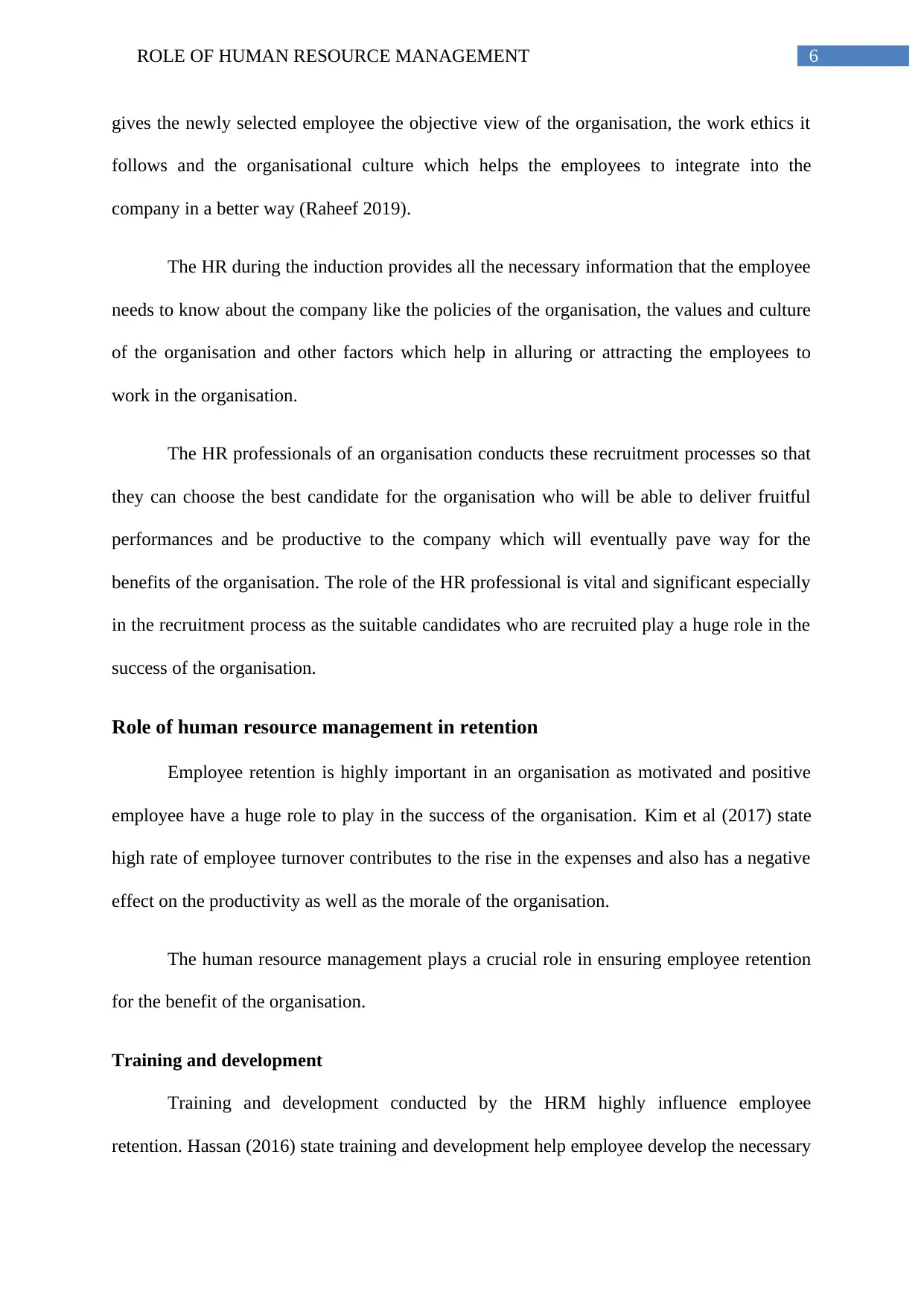
6ROLE OF HUMAN RESOURCE MANAGEMENT
gives the newly selected employee the objective view of the organisation, the work ethics it
follows and the organisational culture which helps the employees to integrate into the
company in a better way (Raheef 2019).
The HR during the induction provides all the necessary information that the employee
needs to know about the company like the policies of the organisation, the values and culture
of the organisation and other factors which help in alluring or attracting the employees to
work in the organisation.
The HR professionals of an organisation conducts these recruitment processes so that
they can choose the best candidate for the organisation who will be able to deliver fruitful
performances and be productive to the company which will eventually pave way for the
benefits of the organisation. The role of the HR professional is vital and significant especially
in the recruitment process as the suitable candidates who are recruited play a huge role in the
success of the organisation.
Role of human resource management in retention
Employee retention is highly important in an organisation as motivated and positive
employee have a huge role to play in the success of the organisation. Kim et al (2017) state
high rate of employee turnover contributes to the rise in the expenses and also has a negative
effect on the productivity as well as the morale of the organisation.
The human resource management plays a crucial role in ensuring employee retention
for the benefit of the organisation.
Training and development
Training and development conducted by the HRM highly influence employee
retention. Hassan (2016) state training and development help employee develop the necessary
gives the newly selected employee the objective view of the organisation, the work ethics it
follows and the organisational culture which helps the employees to integrate into the
company in a better way (Raheef 2019).
The HR during the induction provides all the necessary information that the employee
needs to know about the company like the policies of the organisation, the values and culture
of the organisation and other factors which help in alluring or attracting the employees to
work in the organisation.
The HR professionals of an organisation conducts these recruitment processes so that
they can choose the best candidate for the organisation who will be able to deliver fruitful
performances and be productive to the company which will eventually pave way for the
benefits of the organisation. The role of the HR professional is vital and significant especially
in the recruitment process as the suitable candidates who are recruited play a huge role in the
success of the organisation.
Role of human resource management in retention
Employee retention is highly important in an organisation as motivated and positive
employee have a huge role to play in the success of the organisation. Kim et al (2017) state
high rate of employee turnover contributes to the rise in the expenses and also has a negative
effect on the productivity as well as the morale of the organisation.
The human resource management plays a crucial role in ensuring employee retention
for the benefit of the organisation.
Training and development
Training and development conducted by the HRM highly influence employee
retention. Hassan (2016) state training and development help employee develop the necessary
⊘ This is a preview!⊘
Do you want full access?
Subscribe today to unlock all pages.

Trusted by 1+ million students worldwide
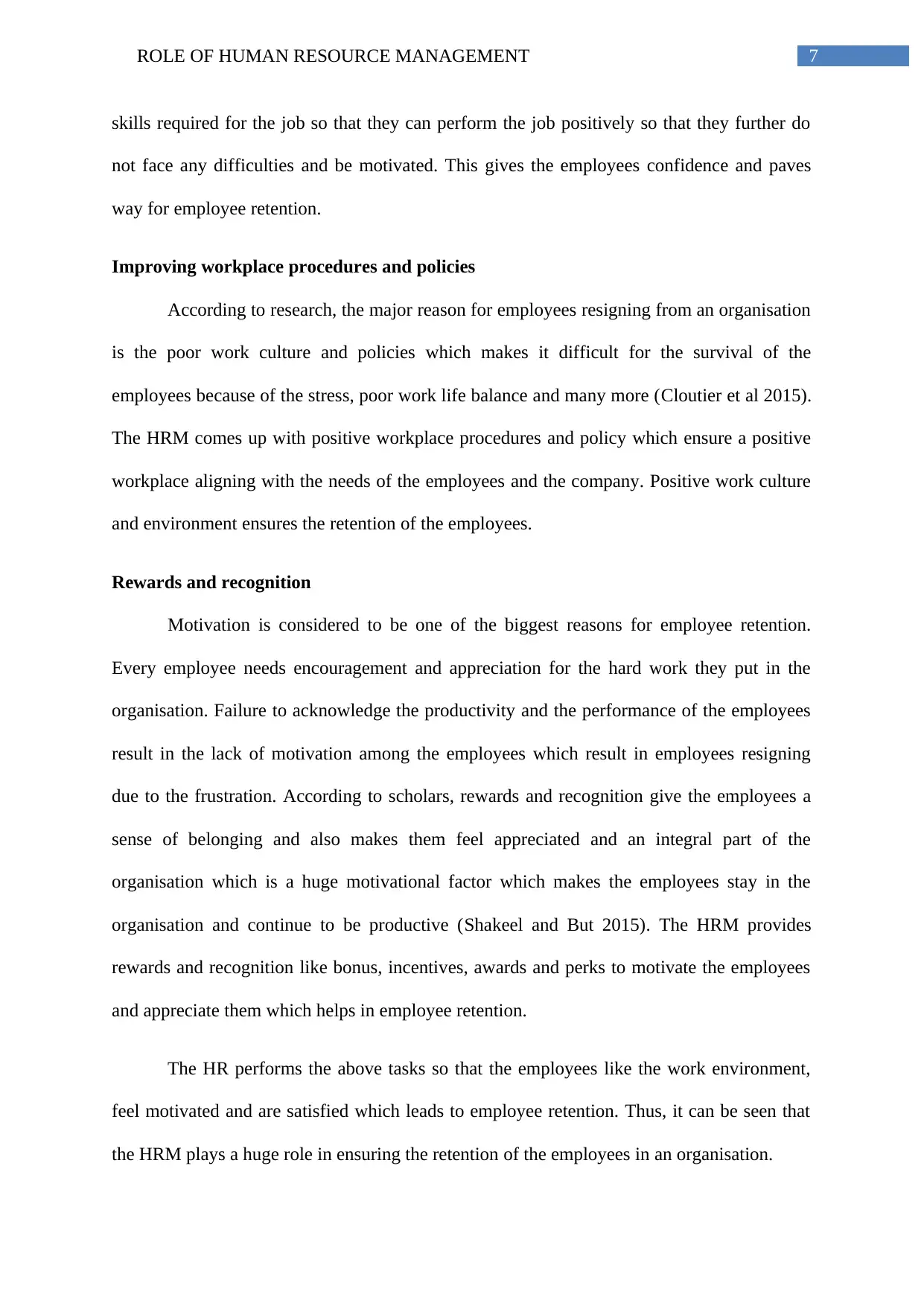
7ROLE OF HUMAN RESOURCE MANAGEMENT
skills required for the job so that they can perform the job positively so that they further do
not face any difficulties and be motivated. This gives the employees confidence and paves
way for employee retention.
Improving workplace procedures and policies
According to research, the major reason for employees resigning from an organisation
is the poor work culture and policies which makes it difficult for the survival of the
employees because of the stress, poor work life balance and many more (Cloutier et al 2015).
The HRM comes up with positive workplace procedures and policy which ensure a positive
workplace aligning with the needs of the employees and the company. Positive work culture
and environment ensures the retention of the employees.
Rewards and recognition
Motivation is considered to be one of the biggest reasons for employee retention.
Every employee needs encouragement and appreciation for the hard work they put in the
organisation. Failure to acknowledge the productivity and the performance of the employees
result in the lack of motivation among the employees which result in employees resigning
due to the frustration. According to scholars, rewards and recognition give the employees a
sense of belonging and also makes them feel appreciated and an integral part of the
organisation which is a huge motivational factor which makes the employees stay in the
organisation and continue to be productive (Shakeel and But 2015). The HRM provides
rewards and recognition like bonus, incentives, awards and perks to motivate the employees
and appreciate them which helps in employee retention.
The HR performs the above tasks so that the employees like the work environment,
feel motivated and are satisfied which leads to employee retention. Thus, it can be seen that
the HRM plays a huge role in ensuring the retention of the employees in an organisation.
skills required for the job so that they can perform the job positively so that they further do
not face any difficulties and be motivated. This gives the employees confidence and paves
way for employee retention.
Improving workplace procedures and policies
According to research, the major reason for employees resigning from an organisation
is the poor work culture and policies which makes it difficult for the survival of the
employees because of the stress, poor work life balance and many more (Cloutier et al 2015).
The HRM comes up with positive workplace procedures and policy which ensure a positive
workplace aligning with the needs of the employees and the company. Positive work culture
and environment ensures the retention of the employees.
Rewards and recognition
Motivation is considered to be one of the biggest reasons for employee retention.
Every employee needs encouragement and appreciation for the hard work they put in the
organisation. Failure to acknowledge the productivity and the performance of the employees
result in the lack of motivation among the employees which result in employees resigning
due to the frustration. According to scholars, rewards and recognition give the employees a
sense of belonging and also makes them feel appreciated and an integral part of the
organisation which is a huge motivational factor which makes the employees stay in the
organisation and continue to be productive (Shakeel and But 2015). The HRM provides
rewards and recognition like bonus, incentives, awards and perks to motivate the employees
and appreciate them which helps in employee retention.
The HR performs the above tasks so that the employees like the work environment,
feel motivated and are satisfied which leads to employee retention. Thus, it can be seen that
the HRM plays a huge role in ensuring the retention of the employees in an organisation.
Paraphrase This Document
Need a fresh take? Get an instant paraphrase of this document with our AI Paraphraser
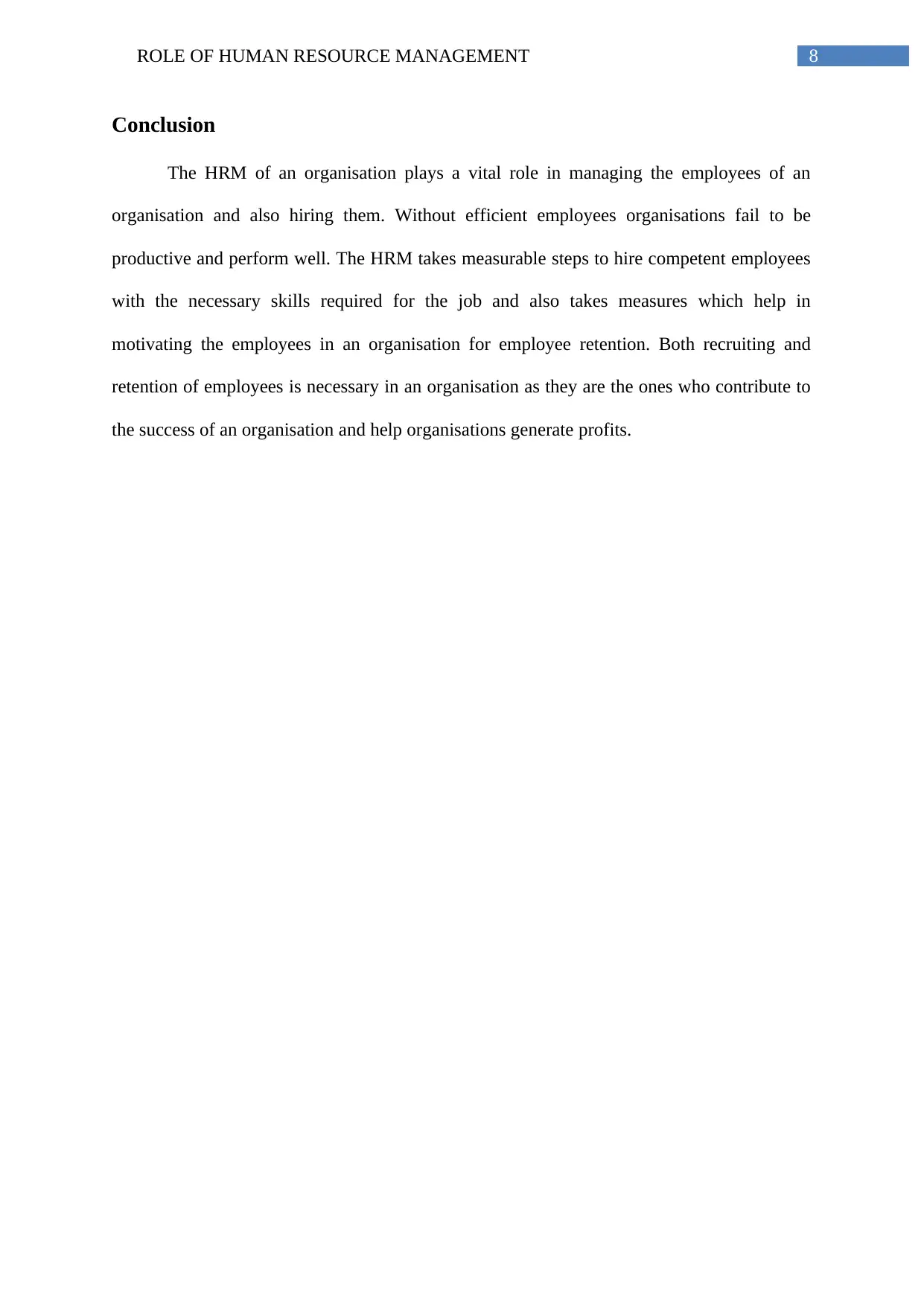
8ROLE OF HUMAN RESOURCE MANAGEMENT
Conclusion
The HRM of an organisation plays a vital role in managing the employees of an
organisation and also hiring them. Without efficient employees organisations fail to be
productive and perform well. The HRM takes measurable steps to hire competent employees
with the necessary skills required for the job and also takes measures which help in
motivating the employees in an organisation for employee retention. Both recruiting and
retention of employees is necessary in an organisation as they are the ones who contribute to
the success of an organisation and help organisations generate profits.
Conclusion
The HRM of an organisation plays a vital role in managing the employees of an
organisation and also hiring them. Without efficient employees organisations fail to be
productive and perform well. The HRM takes measurable steps to hire competent employees
with the necessary skills required for the job and also takes measures which help in
motivating the employees in an organisation for employee retention. Both recruiting and
retention of employees is necessary in an organisation as they are the ones who contribute to
the success of an organisation and help organisations generate profits.
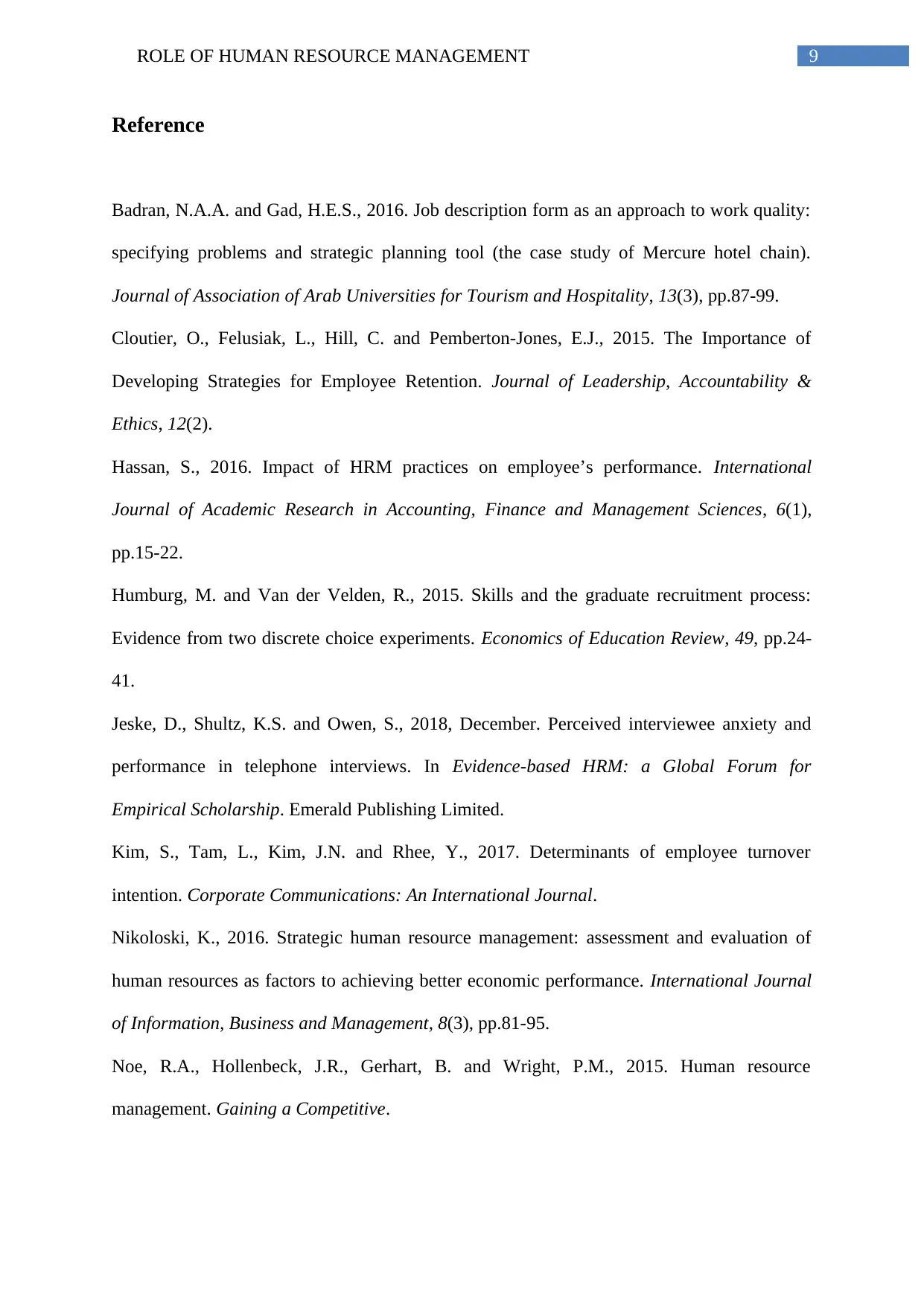
9ROLE OF HUMAN RESOURCE MANAGEMENT
Reference
Badran, N.A.A. and Gad, H.E.S., 2016. Job description form as an approach to work quality:
specifying problems and strategic planning tool (the case study of Mercure hotel chain).
Journal of Association of Arab Universities for Tourism and Hospitality, 13(3), pp.87-99.
Cloutier, O., Felusiak, L., Hill, C. and Pemberton-Jones, E.J., 2015. The Importance of
Developing Strategies for Employee Retention. Journal of Leadership, Accountability &
Ethics, 12(2).
Hassan, S., 2016. Impact of HRM practices on employee’s performance. International
Journal of Academic Research in Accounting, Finance and Management Sciences, 6(1),
pp.15-22.
Humburg, M. and Van der Velden, R., 2015. Skills and the graduate recruitment process:
Evidence from two discrete choice experiments. Economics of Education Review, 49, pp.24-
41.
Jeske, D., Shultz, K.S. and Owen, S., 2018, December. Perceived interviewee anxiety and
performance in telephone interviews. In Evidence-based HRM: a Global Forum for
Empirical Scholarship. Emerald Publishing Limited.
Kim, S., Tam, L., Kim, J.N. and Rhee, Y., 2017. Determinants of employee turnover
intention. Corporate Communications: An International Journal.
Nikoloski, K., 2016. Strategic human resource management: assessment and evaluation of
human resources as factors to achieving better economic performance. International Journal
of Information, Business and Management, 8(3), pp.81-95.
Noe, R.A., Hollenbeck, J.R., Gerhart, B. and Wright, P.M., 2015. Human resource
management. Gaining a Competitive.
Reference
Badran, N.A.A. and Gad, H.E.S., 2016. Job description form as an approach to work quality:
specifying problems and strategic planning tool (the case study of Mercure hotel chain).
Journal of Association of Arab Universities for Tourism and Hospitality, 13(3), pp.87-99.
Cloutier, O., Felusiak, L., Hill, C. and Pemberton-Jones, E.J., 2015. The Importance of
Developing Strategies for Employee Retention. Journal of Leadership, Accountability &
Ethics, 12(2).
Hassan, S., 2016. Impact of HRM practices on employee’s performance. International
Journal of Academic Research in Accounting, Finance and Management Sciences, 6(1),
pp.15-22.
Humburg, M. and Van der Velden, R., 2015. Skills and the graduate recruitment process:
Evidence from two discrete choice experiments. Economics of Education Review, 49, pp.24-
41.
Jeske, D., Shultz, K.S. and Owen, S., 2018, December. Perceived interviewee anxiety and
performance in telephone interviews. In Evidence-based HRM: a Global Forum for
Empirical Scholarship. Emerald Publishing Limited.
Kim, S., Tam, L., Kim, J.N. and Rhee, Y., 2017. Determinants of employee turnover
intention. Corporate Communications: An International Journal.
Nikoloski, K., 2016. Strategic human resource management: assessment and evaluation of
human resources as factors to achieving better economic performance. International Journal
of Information, Business and Management, 8(3), pp.81-95.
Noe, R.A., Hollenbeck, J.R., Gerhart, B. and Wright, P.M., 2015. Human resource
management. Gaining a Competitive.
⊘ This is a preview!⊘
Do you want full access?
Subscribe today to unlock all pages.

Trusted by 1+ million students worldwide
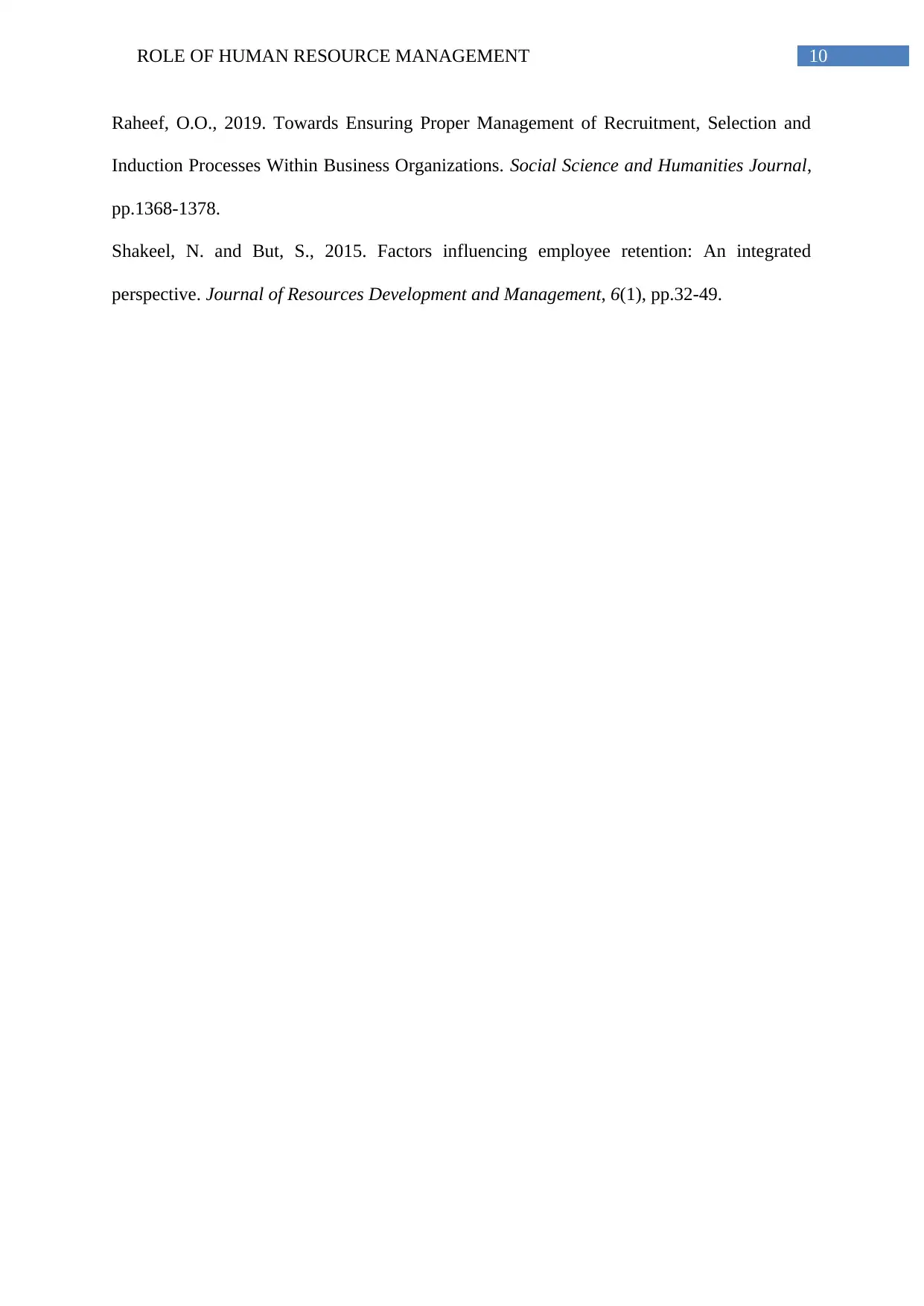
10ROLE OF HUMAN RESOURCE MANAGEMENT
Raheef, O.O., 2019. Towards Ensuring Proper Management of Recruitment, Selection and
Induction Processes Within Business Organizations. Social Science and Humanities Journal,
pp.1368-1378.
Shakeel, N. and But, S., 2015. Factors influencing employee retention: An integrated
perspective. Journal of Resources Development and Management, 6(1), pp.32-49.
Raheef, O.O., 2019. Towards Ensuring Proper Management of Recruitment, Selection and
Induction Processes Within Business Organizations. Social Science and Humanities Journal,
pp.1368-1378.
Shakeel, N. and But, S., 2015. Factors influencing employee retention: An integrated
perspective. Journal of Resources Development and Management, 6(1), pp.32-49.
1 out of 10
Related Documents
Your All-in-One AI-Powered Toolkit for Academic Success.
+13062052269
info@desklib.com
Available 24*7 on WhatsApp / Email
![[object Object]](/_next/static/media/star-bottom.7253800d.svg)
Unlock your academic potential
Copyright © 2020–2025 A2Z Services. All Rights Reserved. Developed and managed by ZUCOL.




